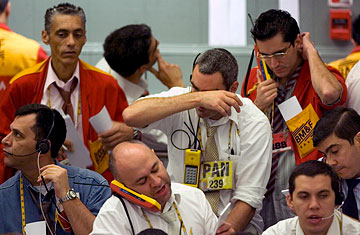
Traders at the BM&F Bovespa Stock Exchange in São Paulo, Brazil, on Oct. 10
American humorist Josh Billings once said, "Remember the poor, it costs nothing." The quip sounds close to the apparent sentiment among G-7 economic policymakers who met in Washington over the weekend to craft measures aimed at bailing out Western banks amid the global financial crisis.
News of plans by the U.S. and European governments to inject cash into troubled banks helped propel stock markets worldwide to record gains Monday and Tuesday. For the first time in weeks investors dared to hope that the financial meltdown may be abating. But budding optimism in Europe and the U.S. may not travel far. Emerging countries lacking the financial muscle to prop up their economies still face troubles ranging from slowing trade to food shortages. "In many developing countries, the most urgent crisis is not what is happening in financial markets but what has happened in commodity markets," says Dominique Strauss-Kahn, managing director for the International Monetary Fund (IMF). "We must not forget this other crisis."
The IMF has vowed to deliver financial relief to any developing country facing an emergency. The World Bank says it has roughly $27 billion ready to offer in loans through the International Bank for Development and Reconstruction. But with a global recession looming, no coordinated plan addressing the needs of poor nations is being discussed. "People are starting to worry a little bit that some of these emerging market countries are the ones that are left out," says Ben Carliner, director of research at the Economic Strategy Institute, a think tank in Washington.
Uniform policy prescriptions don't come easy for a diverse group of countries ranging from Venezuela to Indonesia. For example, banking-sector repair and reform is likely more needed in India than in China, because India's financial sector is more intertwined with Western markets than China's is. Less sophisticated economies that rely on manufacturing and agriculture may largely avoid the pain that has accompanied the worldwide breakdown of complicated financial systems.
But the developing world still must cope with the prospect of lower economic growth in the months ahead that could compound problems for countries that are already struggling. Although prices for oil and other commodities have declined recently, they remain at unusually high levels. Justin Lin, chief economist at the World Bank, says his organization is preparing lending programs to help ease the burden of high food and fuel costs for developing countries. "They still need to have the support, in order to protect the poor," Lin says. But it's unclear how widely available such programs will be.
